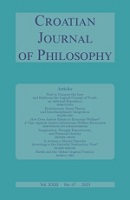How to Conquer the Liar and Enthrone the Logical Concept of Truth: an Informal Exposition
How to Conquer the Liar and Enthrone the Logical Concept of Truth: an Informal Exposition
Author(s): Boris ČulinaSubject(s): Epistemology, Logic, Semantics, Philosophy of Language
Published by: KruZak
Keywords: Paradoxes of truth; the truth predicate; the logical concept of truth; revenge of the Liar; the strong Kleene three-valued semantics; the largest intrinsic fixed point; Kripke-Feferman theory of truth
Summary/Abstract: This article informally presents a solution to the paradoxes of truth and shows how the solution solves classical paradoxes (such as the original Liar) as well as the paradoxes that were invented as counterarguments for various proposed solutions (“the revenge of the Liar”). This solution complements the classical procedure of determining the truth values of sentences by its own failure and, when the procedure fails, through an appropriate semantic shift allows us to express the failure in a classical two-valued language. Formally speaking, the solution is a language with one meaning of symbols and two valuations of the truth values of sentences. The primary valuation is a classical valuation that is partial in the presence of the truth predicate. It enables us to determine the classical truth value of a sentence or leads to the failure of that determination. The language with the primary valuation is precisely the largest intrinsic fi xed point of the strong Kleene three-valued semantics (LIFPSK3). The semantic shift that allows us to express the failure of the primary valuation is precisely the classical closure of LIFPSK3: it extends LIFPSK3 to a classical language in parts where LIFPSK3 is undetermined. Thus, this article provides an argumentation, which has not been present in contemporary debates so far, for the choice of LIFPSK3 and its classical closure as the right model for the truth predicate. In the end, an erroneous critique of Kripke-Feferman axiomatic theory of truth, which is present in contemporary literature, is pointed out.
Journal: Croatian Journal of Philosophy
- Issue Year: XXIII/2023
- Issue No: 67
- Page Range: 1-31
- Page Count: 31
- Language: English

